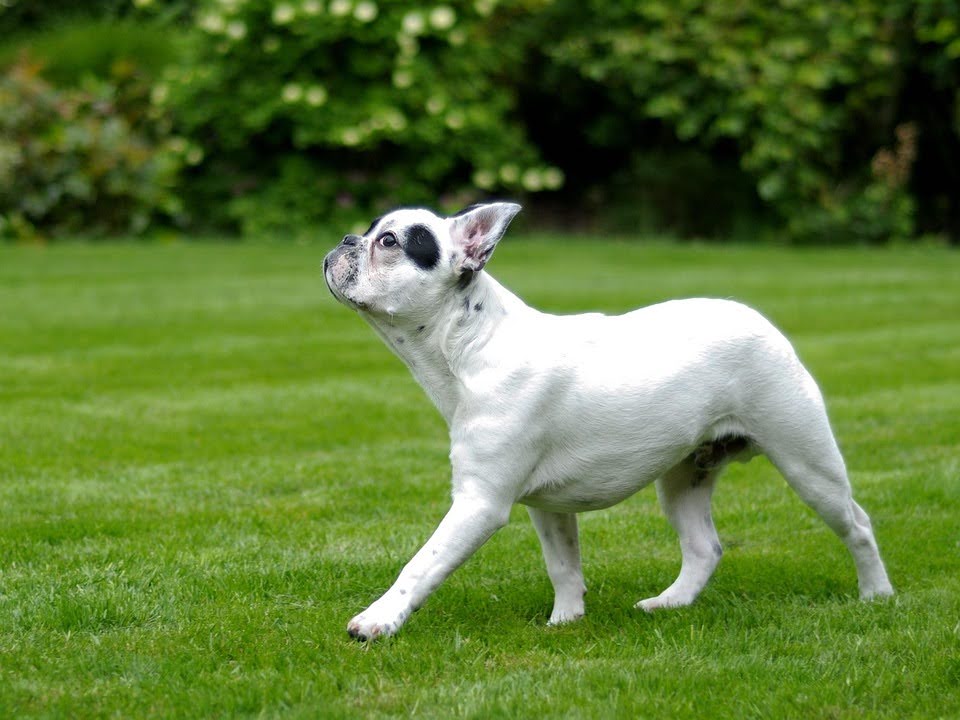White French Bulldogs: A Guide to Caring and Finding a Puppy

Meet the white French Bulldog, a rare beauty that doesn’t just turn heads with its snowy coat, but also steals hearts with its loyalty and sassiness!
This sought-after color may enchant any French Bulldog lover out there, but behind those adorable wrinkles lies a breed with unique needs, from sun-safe snuggles to cleaning routines.
Whether you’re drawn to their pristine looks or their legendary couch potato nature, we’re breaking down everything you need to know, including decoding their genetics and finding an ethical breeder.
Consider this your ultimate guide to white French Bulldogs. If you are ready to fall head over paws, let’s begin!
What is a White French Bulldog?
A white French Bulldog is a breed hue known for its snowy coat and signature bat ears. Unlike standard Frenchies, their striking white fur can come in solid white (completely pigment-free), although it can also show small markings of other colors (like black or fawn).
This rare coat tone is caused by specific genetic factors. Despite their unique look, white French Bulldogs share the same affectionate and sometimes stubborn personality as their colorful counterparts.
However, their light coat requires extra care to keep clean and healthy. If you’re drawn to their elegance, you’ll want to understand their genetics and specific care needs.
The White Gene and Its Expressions
This French Bulldog’s white coat isn’t an accident: it’s the result of decades of careful breeding.
Unlike common Frenchie colors, the pure white variation is rare and highly sought after, thanks to its unique genetic makeup. A pure white French Bulldog gets its snowy fur from the recessive white gene, which suppresses pigment production.
Unlike pied or cream Frenchies, these dogs have an entirely, or almost all, white coat.
The American Kennel Club (AKC) recognizes it as a natural coloration, but only when it meets certain requirements, since this gene can pose several health risks.
White French Bulldogs should not have pale green or blue eyes, or noses any color other than black, since they may develop hearing or sight issues, even when the puppy seems healthy. A well-bred white gene presents shades of brown or black eyes, and shiny black noses to contrast with the white coat.
5 Unique Characteristics of white French Bulldogs
White French Bulldogs aren’t just rare; they have some special traits that set them apart from other Frenchies! Here’s what makes them so unique:
– Sun-Sensitive Skin: That gorgeous pale coat means their skin is more prone to sunburn. Doggy sunscreen or a stylish rash guard for outdoor adventures is a must! Their short coat makes their shedding manageable, too.
– Dark Eyes and Nose: A well-bred white French Bulldog should still have a black nose and dark brown eyes, proving proper pigment and a lower risk of genetic issues.
– “Ghostly” Expressions: Their lack of dark facial masking makes their expressions extra dramatic – every side-eye, pout, or Frenchie smile is highly noticeable!
– Rare and in High Demand: Solid white Frenchies are some of the hardest to find, making them a prized (and often pricier) pick among French Bulldog lovers.
– Not Albino!: Unlike albino dogs, which may suffer from several congenital issues, healthy white Frenchies have normal eye/nose pigment, just with a recessive white coat gene. In fact, they may even present small spots of other colors and hues.

White French Bulldog Color Variations
While most white French Bulldogs are fully white, the breed standard does allow for small markings or “accents” of other colors. These variations still classify the dog as a white Frenchie, as long as white is the dominant hue of the coat.
Here are the most common approved patterns:
– White with Fawn Patches: A mostly white coat with subtle fawn markings (usually around the ears, eyes, or back).
– White with Cream Accents: Light cream patches blend softly into the white base.
– White with Minimal Brindle Spots: Tiny brindle streaks for a slight “ticked” effect.
– White with Black “Freckles”: A few sparse black spots, often on the ears or muzzle.
While these minor markings are acceptable, completely solid white remains the rarest and most sought-after variation. However, responsible breeders prioritize health over color patterns, so whether your Frenchie has a tiny fawn spot or is pure white, what matters most is ethical breeding and genetic testing.
How to Care for a White French Bulldog
While white French Bulldogs share the same lovable and goofy natures as other Frenchies, their striking coat requires some extra care. From grooming to diet, here’s how to take extra good care of your pup!
Grooming and Hygiene
– Stain Prevention: Their light fur shows dirt easily! Wipe their face (especially wrinkles) daily and bathe them monthly with a gentle shampoo.
– Sun Protection: Pale coats mean sensitive skin. Use pet-safe sunscreen on their nose and ear area before outdoor adventures.
– Ear & Eye Care: Check weekly for tear stains (common in white dogs) and clean with a vet-approved solution. Clean their ears once a week.
Diet and Nutrition
– High-Quality Protein: Make sure your white French Bulldog has a diet that supports skin and coat health. Look for salmon, lamb, or chicken-based formulas.
– Omega Fatty Acids: Consider supplementing fish oil or any other source of omega fats since it reduces dryness and keeps their coat bright.
– Allergy Awareness: White Frenchies may be prone to food sensitivities. Grain-free or limited-ingredient diets can help prevent allergies.
– Track Weight Weekly or Bi-Weekly: White Frenchies are prone to obesity. Keep them lean to avoid joint stress and further breathing issues.
Socialization, Training, and Wellness
– Early Socialization: Introduce your white French Bulldog to new people, pets, and environments to build confidence as they grow!
– Positive Reinforcement: Frenchies respond very well to reward-based training. Treats motivate them a lot, so make sure you figure out which ones are their favorite!
– Routine Vet Checks: Their genetics may require extra screenings for deafness or skin conditions. Keep an eye on your Frenchie’s health throughout its life.
5 Training Tips for White French Bulldog Puppies
Training a white Frenchie puppy requires patience, consistency, and a little extra know-how, especially since their good looks don’t come with built-in obedience. Here’s how to set them up for success:
– Begin Early Training: Start training the day you bring your puppy home. White Frenchies are smart but stubborn, meaning that routine is key for mastering commands. Stay consistent and you will see improvements over time!
– Use High-Value Treats: Their love for food is a trainer’s best tool. Tiny, soft treats (like salmon bites) keep them motivated without overfeeding.
– Keep Sessions Short: 5-10 minutes training sessions prevent boredom. End on a positive note (like a successful “sit”) to build up confidence.
– Socialize Adequately: Introduce them to diverse sounds, people, environments, and dogs early to prevent nervousness as they grow.
– Skip the Harsh Methods: Positive reinforcement works best. Scolding can make them shut down since white French Bulldogs are a sensitive breed. Redirect bad habits patiently.
With these tips, your white Frenchie will grow into a well-mannered companion. Just remember that their stubbornness is part of the charm!

Browse our gallery of French Bulldog puppies and find your new best friend. The adventure awaits!
Growth Milestones for White French Bulldogs
Nothing can prepare you to see that tiny snowball you just brought home grow into a sturdy adult – it’s a sentimental and exciting journey at the same time! Here’s what to expect at each stage:
Newborn to 8 Weeks
– 0-2 Weeks: Helpless, eyes/ears closed, fully dependent on mom.
– 3-4 Weeks: Eyes open (dark brown in healthy pups), first wobbly steps.
– 6-8 Weeks: Weaned, playful, and ready for basic training foundations.
8 Weeks to 6 Months (Rapid Growth Phase)
– 2-4 Months: Baby teeth fall out; chew toys are a must! Weight doubles.
– 4-6 Months: Adult coat starts replacing puppy fluff. Ears fully erect (if they weren’t already).
6-12 Months (Adolescence)
– 6-9 Months: Reaches 80% of adult size. Stubbornness may peak—keep training consistent!
– 10-12 Months: Growth slows; adult personality solidifies.
12-18 Months (Adulthood)
– Muscle tone fills out.
– Energy levels stabilize.
Where do I find White French Bulldogs for sale?
White French Bulldogs are rare, and finding a healthy, ethically bred puppy requires careful research.
Unlike common coat colors, the white Frenchie’s unique genetics demand extra scrutiny, so knowing where to look (and what red flags to avoid) is essential.
Here’s your roadmap to a responsible purchase:
Pick Responsible Breeders
When searching for a white French Bulldog, choosing a responsible breeder is absolutely critical.
The best breeders prioritize the health and well-being of their dogs above all else, especially when working with the delicate genetics of white-coated Frenchies.
They conduct comprehensive health testing on the parent dogs, including tests for deafness (a particular concern in white French Bulldogs), hip dysplasia screenings, and checks for skin allergies, which are more common in dogs with light coats.
Additionally, avoid breeders who market “exotic” traits, such as blue eyes or pink noses. These features often indicate irresponsible breeding practices that disregard health in favor of rare aesthetics.
A reputable breeder will provide documented proof of all genetic screenings, detailed records of puppy socialization, and a clean, nurturing home environment where puppies are raised as part of the family.
In Kingdom Frenchies, a family-based business accredited by the Better Business Bureau (BBB) and licensed with the Ohio Department of Agriculture, every puppy is guaranteed, vaccinated, and vet-checked to ensure they grow to be a happy, healthy French Bulldog.
Inquire Before Buying
Ask these non-negotiable questions to ensure you bring home a happy, healthy white Frenchie:
– “Can I meet the puppy’s parents?” – Meeting them allows you to assess their health, temperament, and living conditions. A breeder who hesitates or makes excuses may have something to hide.
– “What’s your protocol if my puppy develops a genetic issue?” – Ethical breeders stand behind their puppies and often provide health guarantees or support if hereditary problems arise.
– “Do you follow the breed standard for pigment?” – A proper white Frenchie should have dark eyes and a black nose since light pigment can indicate underlying health risks.
– “How do you socialize your puppies before they go home?” – Early socialization (exposure to sounds, people, and handling) is crucial for a well-adjusted adult dog.
– “Can you provide references from past buyers?” – Happy, long-term owners are a strong indicator of a breeder’s reputation. Kingdom Frenchies, for example, provides previous customers’ testimonials online.
– “What vaccinations and vet checks has the puppy had?” – Ensure the puppy is up-to-date on shots and has been examined by a veterinarian.
Look for a Healthy White Gene Breeding
While the white coat gives French Bulldogs their snowy appearance, the genetics behind it come with potential health concerns that demand careful breeding practices.
The white gene isn’t simply a cosmetic trait. It can be linked to several serious health risks, so responsible breeding plays a key role in ensuring healthy, well-structured Frenchies.
One of the most significant concerns is the increased likelihood of deafness, particularly in puppies with blue eyes and pink noses. Reputable breeders always conduct BAER (Brainstem Auditory Evoked Response) hearing tests on puppies at six weeks or older to identify any hearing impairments.
Another common issue is skin sensitivity, as white Frenchies are more prone to allergies, sunburn, and skin irritation. This makes it crucial to select breeding stock with robust skin health and to avoid lines with histories of dermatological problems.
Finally, truly responsible breeders adhere to strict ethical standards when working with the white gene. They never breed two white parents together, as this dramatically increases the chances of genetic health issues in the offspring. They also avoid chasing dangerous “designer” trends like merle/white crosses, which may compound severe genetic problems.

Are White French Bulldogs Right for You?
So, you’re smitten with those pale good looks – but is a white Frenchie actually the perfect match for your lifestyle? Let us help you find out!
White French Bulldogs are good for you if:
– You’re ready for stain cleaning (think: post-muddy-walk paw-wipes and wrinkle-cleaning rituals).
– You want a lap-loving clown. Frenchies are equal parts cuddly and hilarious!
– You can provide sun-safe moderate adventures (doggy sunscreen and shade breaks included).
Think twice if:
– You want a low-maintenance pup. Their coat needs slightly more grooming than darker Frenchies.
– You’re not home often. White French Bulldogs thrive on companionship and can’t handle long solo hours.
– You’re budget-conscious. Ethical white Frenchies are pricey, and their healthcare can be too.
If you’re seeking for a dog that can be a great indoor all-time companion, a white Frenchie might be the right choice!
Just commit to finding a well-bred pup, so start your journey in our French Bulldog puppy gallery!
Frequently Asked Questions
Are White French Bulldogs good with kids?
Absolutely! White French Bulldogs are playful, patient, and love being part of a family – just supervise interactions with very young kids since their compact size makes them fragile.
Are White French Bulldogs rare?
Yes, solid white Frenchies are rare due to their recessive genes. Because of this, avoid breeders who overhype “exclusivity” at the expense of health. Ethical rarity comes from responsible breeding, not just coat color.
Are White French Bulldogs recognized by kennel clubs?
Yes, they are! The AKC accepts white French Bulldogs if they have standard dark eyes/noses. Non-standard traits (blue eyes or pink noses) may disqualify them from shows.
How long do White French Bulldogs live?
White French Bulldogs live 10 to 12 years on average. Healthy, well-bred Frenchies can thrive longer with proper care (for example, weight management and skin protection).
Do White French Bulldogs cost more?
Yes, white French Bulldogs are pricier since their rarity can inflate prices. However, you should never compromise on health testing to save money. Ethical breeders charge for quality, not just color.
Key Takeaways
– White French Bulldogs are rare due to recessive genes. So that their unique coat doesn’t compromise health, they should ideally have dark eyes and noses as per breed standards.
– Their light coat requires regular cleaning to prevent stains, along with sun protection like pet-safe sunscreen for outdoor activities.
– Responsible breeders conduct BAER hearing tests and screen for skin allergies, as the white gene can increase risks like deafness and sun sensitivity.
– White French Bulldogs’ personalities are playful and affectionate. They thrive in family environments but also with solo owners, as long as they have company most of the time.
– Early socialization and positive reinforcement work best, as the stubbornness of the breed requires patience and consistency.
– You should avoid breeders who prioritize color over health, especially those marketing high-risk traits. Choose responsible breeders who are certified and can guarantee your puppy.
– With proper diet, exercise, and routine veterinary checks, white French Bulldogs typically live 10-12 years, making them a long-term, loving commitment!
